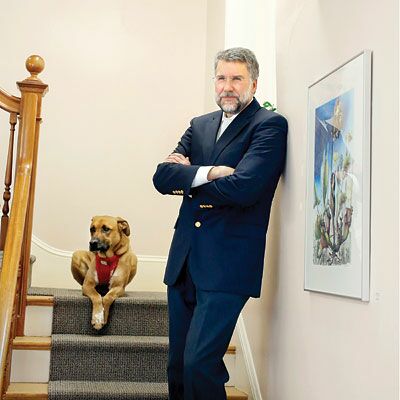Q&A: Art Boulay on his award-winning work with veterans
 PHOTo / Tim greenway
Art Boulay, CEO of Strategic Talent Management in Brunswick with his office dog, Fenway, helps returning veterans hone in on their interests and talents to find meaningful work.
PHOTo / Tim greenway
Art Boulay, CEO of Strategic Talent Management in Brunswick with his office dog, Fenway, helps returning veterans hone in on their interests and talents to find meaningful work.
Art Boulay has been a stalwart of the Androscoggin County Chamber of Commerce since the mid '90s, but it was his recent outreach to returning veterans that brought him to the dais Jan. 23 to accept the chamber's most prestigious honor.
Boulay, CEO of Strategic Talent Management, a business consulting firm based in Brunswick, is this year's recipient of the chamber's Ray Geiger Award, named for the editor of Farmers' Almanac who set the bar for civic commitment in the Lewiston-Auburn area. Chip Morrison, chamber president, says Boulay epitomizes Geiger's commitment to and support of the region — having served in leadership roles on the chamber's board, conducted seminars for members and, over the past year, done free behavioral appraisals for unemployed veterans who've taken advantage of free chamber membership.
Boulay says the appraisals assess the soft skills of job applicants — such as what motivates them, their ability to work as part of a team and whether they have the drive and attitude needed to succeed in the particular job they're seeking.
He spoke recently with Mainebiz about his role in the chamber's veterans initiative. The edited transcript follows.
Mainebiz: What was behind the idea of offering appraisals to veterans?
Art Boulay: We recognized that we had a lot of people coming back from Iraq and Afghanistan and that many of them were National Guard. They were average people expecting to do their two weeks of duty in the Guard and they were called to go to war. A lot of people got caught up in that and found it challenging to assimilate and get back into the work force, especially in the teeth of a serious recession.
The chamber's concept was to embrace these people, let them know we exist and offer them free memberships so they can come to our events and meet potential employers. And they would meet other people, too — for example, all the educational institutions in L-A are members [of the chamber]. There are all sorts of resources for veterans who might not typically think of going to a chamber meeting.
MB: How does the appraisal work?
AB: Most assessments today are done online. Myers-Briggs is an example of a behavioral assessment and it's quite useful in understanding how people will interact with others and so forth. But we go deeper and look at an individual's motivators: What drives you to do what you do? Those motivators can really clarify and help people who are looking at jobs identify which 'ballpark' they should be looking at, or working at.
Then, and this is really where the science comes in, we use a derivative of the Hartman index. The index really gets to attitudes, talents, beliefs, energy levels. The index not only provides a very complete picture of how you interact with people and why you do what you do, it also highlights the performance level that you bring to the table. It's at that last level that we're sometimes able to identify specific obstacles that people ought to look at.
MB: Are people typically nervous knowing that much about themselves?
AB: Yes. There is a lot of hesitation for individuals because they make assumptions that this assessment is going to reveal some deep and dark secrets. And I always tell them, 'You know what? If I gave this report to your mother she'd be chuckling out loud all the way through it.' That's because anybody who knows you very well could write the same report. We're just able to do that scientifically and efficiently and we don't have to bother your mother.
MB: Can you say how it's helped the veterans you've assessed?
AB: It's hard to say. Mostly we help them identify something they've always known about themselves, although often it might be in the back of their mind. We validate it for them. The idea being that some of those interests you have in the back of your mind are actually talents you should exploit or promote to a new employer. It helps them make the transition they need to make.










Comments